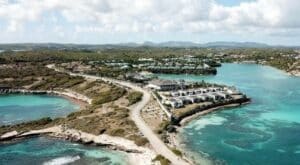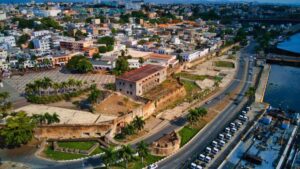The Caribbean holds the crown as a go-to destination for tourism, but it is also emerging as a fiscally attractive place for starting, relocating, or expanding business. Most islands in the Caribbean are multilingual and the region is next door to the US, boosting the appeal of starting a business in Caribbean islands among foreign companies and entrepreneurs. This guide provides the following insights:
- Caribbean business registration benefits
- Business opportunities in the Caribbean
- Caribbean’s best places to start a business
- Starting a business to get Caribbean citizenship
- International Business Company registration
- How to start a business in the Caribbean
Why Register a Company in the Caribbean
Favorable business taxes: Islands like the Cayman Islands and Anguilla do not charge corporate income tax.
- Strong privacy policies: Foreign nationals can incorporate business and keep ownership details confidential.
- Fast incorporation: Some companies can be registered in Caribbean jurisdictions within 24 to 48 hours with minimal paperwork.
- Asset protection laws: Assed protection legislation in islands like Nevis, the Cayman Islands, and the British Virgin Islands protects assets from lawsuits and creditors.
- Business friendliness: The rules are simple for registering companies in the Caribbean region, whether for a new company or international expansion.
- Citizenship: Some countries offer Caribbean citizenship by investment programs that allow potential investors to establish a business and obtain citizenship.
- Offshore banking benefits: One of the Caribbean’s economic strengths is its favorable environment for offshore banking, with companies able to access multi-currency accounts and wealth management options.
Business Opportunities in the Caribbean
Hi-tech agribusiness
Agribusiness is a growing industry in the Caribbean, receiving $919.1 million in foreign direct investment between 2003 and 2020. The hi-tech agribusiness is valued at $369 billion, drawn from a population of 30 million and 30 million affluent annual visitors. Beyond Caribbean nations, entrepreneurs who invest in the Caribbean agribusiness industry can easily access international markets.
Tourism rentals

Additionally, compared to other industries, tourism rentals are affordable businesses to start, with low operational costs that allow for high-profit margins.
Citizenship by investment
The St Lucia citizenship by investment allows foreign investors to start a business in the Caribbean and obtain citizenship and a second passport. Applicants are required to invest $250,000 in an approved enterprise and can include their family members in the application. Other options include a non-refundable contribution to the state fund and government bond acquisition.
Renewable energy
The Caribbean’s growing economy and population and global initiatives to combat climate change have fueled renewable energy projects. The Caribbean Community has set a target of generating 48 percent of its energy from sustainable sources by 2030–four times more than it does currently–meaning investors can contribute to diversifying economic strengths in the Caribbean and capitalize on the region’s push for climate sustainability.
Tourist accommodation

A benefit of developing tourism accommodation is the opportunity to obtain a Caribbean passport. St Kitts and Nevis allows foreign investors to acquire shares valued at least $325,000 of approved real estate projects such as boutique hotels and luxury resorts and obtain St Kitts and Nevis dual citizenship.
Technology and support
It’s no coincidence that multinational companies are expanding their technology and business support projects to the Caribbean. The Caribbean’s higher education institutions and 80,000 students annually graduating, with 38 percent coming from social sciences and economics majors, means the region offers a productive workforce for technical and business support outsourcing.
Where to start a business in the Caribbean?
Antigua and Barbuda

The Antigua and Barbuda citizenship by investment program allows investors to invest in several tech-related companies, such as Client Communications Services Inc., which provides international telecommunication services, and obtain an Antigua and Barbuda passport.
Turks and Caicos Islands
It’s hard to find negatives when starting a business in the Turks and Caicos Islands. With a strong and growing economy, a business-focused environment, and government-backed tax incentives, the island makes a great choice for establishing a business in fintech. The Turks and Caicos Islands is a British Overseas Territory with a reputable selection of offshore Caribbean banks that make it easy to do business within the region and internationally.
St Kitts and Nevis
St Kitts and Nevis is one of the world’s most sought-after destinations for obtaining investment citizenship. The St Kitts and Nevis citizenship by investment program provides internationally recognized real estate developments and brands like the Four Seasons Resort Estates, allowing foreigners to make a lucrative foreign investment and obtain the Caribbean’s most powerful passport by investment.
Furthermore, the St Kitts and Nevis government signaled its commitment to business-friendly by reducing the corporate tax rate in January 2024 from 33 percent to 25 percent. The country also offers corporate tax holidays to start-ups for up to 15 years, allowing them to avoid taxes or pay taxes at a reduced rate.
Grenada
While many islands in the Caribbean have a long-standing reputation for a pro-business environment or large tourism industries, Grenada is an emerging hotspot to start a business. The country’s primary currency is the Eastern Caribbean Dollar, which is pegged to the US dollar, and banks in Grenada are some of the most reliable in the region, giving it a stable financial environment. The Grenada citizenship by investment program offers several luxury accommodation projects in which to invest and obtain Caribbean citizenship.
Dominican Republic

With the country’s tourism industry projected to continue linear growth, proven by Arajet’s aggressive push to expand flight routes, entrepreneurs can expect sustainable returns.
St Lucia
St Lucia offers the perfect combination of business-friendliness, strong tourism, and investor incentives. St Lucia banks are reputable, offering structured corporate banking services, and foreign nationals can invest in St Lucia through an approved enterprise in one of the country’s priority sectors and qualify for Caribbean citizenship.
Jamaica
Jamaica has the Caribbean’s largest population of English speakers. With support from the International Monetary Fund (IMF), the World Bank, and the Inter-American Development Bank, the country has transformed into a business-friendly location. Jamaica offers potential investors an ideal location to outsource processes and reduce costs while leveraging the services of a highly skilled workforce.
Dominica
In recent years, Dominica has emerged as a prime location for business investment. A business report released by the Economic Commission for Latin America and the Caribbean (ECLAC) stated that the island was the fastest-growing economy in the Caribbean region. Dominica is another country offering Caribbean citizenship by investment. Investors can acquire Dominica real estate in approved projects and acquire a second passport.
Comparing the best places to start a business in the Caribbean
Country | Ease of Doing Business Ranking | Starting a Business Ranking | Corporate Tax Rate | Value-Added Tax Rate |
Antigua and Barbuda | 5 | 12 | 25 percent | 15 percent |
Turks and Caicos Islands | - | - | 0 percent | 0 percent |
St Kitts and Nevis | 11 | 9 | 25 percent | 17 percent |
Grenada | 12 | 5 | 25 percent | 15 percent |
Dominica Republic | 6 | 11 | 27 percent | 18 percent |
St Lucia | 2 | 2 | 30 percent | 12.5 percent |
Jamaica | 1 | 1 | 25 percent | 15 percent |
Dominica | 4 | 3 | 25 percent | 15 percent |
Countries to Start a Business and Get Caribbean Citizenship
Antigua and Barbuda and St Lucia are two Caribbean countries that allow entrepreneurs and angel investors to invest in a new business or existing enterprise and obtain a Caribbean passport. There are some differences in the requirements to start a business for citizenship, so here is a table comparing the two options.
Factor | Antigua and Barbuda | St Lucia |
Minimum Joint Investment | $400,000 in a $5 million joint enterprise | $250,000 in a $6 million joint enterprise |
Minimum Sole Investment | $1.5 million | $3.5 million |
No. of Approved Projects | 11 | 2 |
New Business Investment Option | Yes | Yes |
Time to Citizenship | 6 months | 10 to 12 months |
Residency Requirement | Yes (5 days in first 5 years) | No |
International Business Registration

- Family wealth protection
- International investments
- International commercial trading
- Company shares diversification
- Leasing global assets
- Neutral registration of ships, yachts, and other vessels
- Trust management
While the recommended authorized capital is about $50,000, most Caribbean countries do not have a capital requirement.
The legal requirements to establish an IBC vary from country to country, but here are the general requirements in Antigua and Barbuda:
- An IBC only requires one shareholder.
- Shareholders can be individuals or legal entities.
- Two Antigua citizens and an attorney or authorized legal entity registered in Antigua can form an IBC.
- Every IBC must have a local registered agent with a registered office address.
- Every IBC must have a globally recognized abbreviation (e.g., Ltd or LLC).
The average cost to register a company in the Caribbean is $1,200. Foreign companies are usually registered with an authorized capital of $25,000 to $50,000 and shares with a par value of $1, although the law does not specify minimum authorized capital amounts.
Required documents
Documents to be uploaded on the state portal for registering a company:
- Company charter
- Company Memorandum of Association
- Shareholders passports’ copies
- Confirmation of the authorized capital.
- Director appointment letter
- Director consent letter
- Direct first resolution letter
- Share certificate
- Registered address of shareholders
Official company documents must be translated into English and apostilled.
Steps to open an International Business Company in the Caribbean
- The local resident agent must submit a request for approval for the company name.
- After approval, a copy of the approval is sent to the agent electronically.
- The resident agent must provide the required documents for review.
- A Certificate of Incorporation is issued to the registered agent.
- The resident agent can have a bank account with a local bank.
How to Open a Business in the Caribbean

- Choose a jurisdiction
- Determine the best Caribbean island for your business by considering how it aligns with your business goals (e.g., Caribbean citizenship eligibility, no income tax, or offshore finance).
- Establish a business structure
- LLC: Popular among small businesses and foreign investors.
- IBC: Ideal for international companies seeking corporate tax optimization.
- Partnership/Sole proprietorship: Simple company registration process.
- Company name search
- Search for a unique business name with the national Company Registry, such as ciregistry.ky for the Cayman Islands.
- Register the name with the Company Registry.
- Submit incorporation documents
- Articles of Incorporation or Memorandum of Association (business structure, shareholder details, company purpose).
- Bylaws or Operating Agreement (company rules).
- Registered Office and Local Agent (for jurisdictions that require a local agent).
- Acquire the necessary business licenses or permits
- Some industries require specific licenses before companies can legally operate in the Caribbean. For example, commercial vessel operators in Antigua and Barbuda are required to have a Boatmaster License, and farmers in Jamaica are required to apply for the Certification of Agricultural Produce Programme (CAP).
- Open a corporate bank account
- Open an account with a local Caribbean bank or international bank for offshore finance operations.
- Provide company documents, proof of ownership, and an initial deposit (if required).
- Get a tax identification number
- Apply for a Taxpayer Identification Number (TIN) with your company documents with the National Inland Revenue Division or Department.
Why use Global Citizen Solutions?
Global Citizen Solutions is a multidisciplinary firm offering bespoke residence and citizenship solutions in Europe and the Caribbean. In a world where the economy and politics are unpredictable, having a second citizenship opens up opportunities and creates flexibility for you and your family.
So, why work with Global Citizen Solutions to obtain Caribbean citizenship?
- Global approach by local experts: We are corporate members of the Investment Migration Council, with local expertise in all five Caribbean CBI programs.
- 100 percent approval rate: We have never had a case rejected and will offer you an initial, free-of-charge, due diligence assessment before signing any contract.
- Independent service and full transparency: We will present to you all the investment options available, and all expenses will be discussed in advance, with no hidden fees.
- An all-encompassing solution: A multidisciplinary team of immigration lawyers, investment specialists, and tax experts will take into consideration all your and your family's mobility, tax, and lifestyle needs.
- Confidential service and secure data management: All private data is stored within a GDPR-compliant database on a secure SSL-encrypted server.

Frequently Asked Questions about Starting a Business in the Caribbean
Can a foreigner start a business in St Lucia?
The Caribbean has no restrictions on foreigners opening businesses. Provided investors fulfill the necessary criteria and submit the required documentation, they can be issued registration documents in as little as 24 hours.
What is the best business to start in the Caribbean?
The best business to start in the Caribbean will be determined by personal preference, financial means, and future goals. If you’re a foreign investor seeking a plan B passport, you may opt to invest in an approved business idea in the St Lucia citizenship program, whereas fintech entrepreneurs may choose tech start-ups or outsource business processes to the region.
How to make money in the Caribbean?
One of the most straightforward ways to make money in the Caribbean is to develop boutique or luxury tourist accommodations as the Caribbean is growing in popularity among affluent travelers, and many countries do not impose Caribbean taxes on income or annual property, inheritance, wealth, and capital gains tax.
Which Caribbean country is the best to do business in?
While your choice of the best Caribbean island to start a business in will be shaped by your choices, budget, and long-term vision, Jamaica ranks highly for the best country to do business in the Caribbean due to its number one ranking for starting a business and number one ranking for ease of doing business in the Caribbean in the World Bank’s Ease of Doing Business rankings.
What are the most profitable business ideas for the Caribbean?
Some of the most profitable large and small business ideas in the Caribbean include tourist accommodation, renewable energy, and outsourced technical or business support services.

 Favorable business taxes: Islands like the Cayman Islands and Anguilla do not charge corporate income tax.
Favorable business taxes: Islands like the Cayman Islands and Anguilla do not charge corporate income tax.
